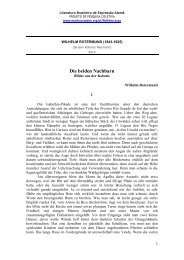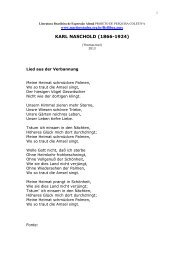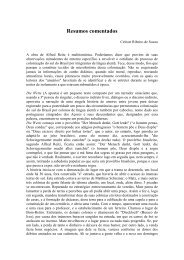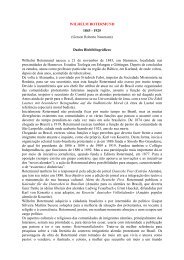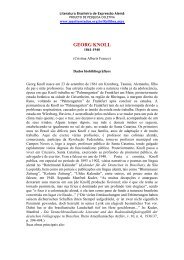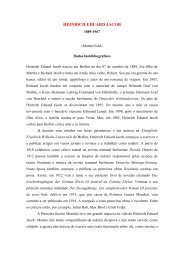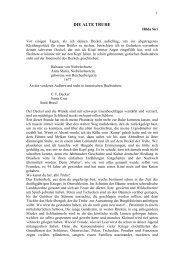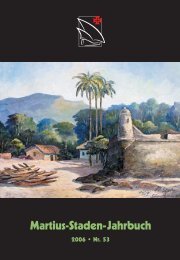- Seite 2 und 3:
Martius-Staden-Jahrbuch 2007 • Nr
- Seite 4 und 5:
Protagonismo juvenil: Proposta para
- Seite 6 und 7:
Marcel Vejmelka erinnert an den The
- Seite 8 und 9:
que, após sua imigração ao Brasi
- Seite 10 und 11:
10 teilweise brasilianischer Film a
- Seite 12 und 13:
12 Chile (erschienen 1979) oder Mem
- Seite 14 und 15:
14 Film der auf der Romanvorlage De
- Seite 16 und 17:
16 schrift über diesen Bildhauer e
- Seite 18 und 19:
18 Filmen wie Behind the sun oder D
- Seite 20 und 21:
http://www.indiosonline.org.br/
- Seite 22 und 23:
22 So oder ähnlich denken nicht we
- Seite 24 und 25:
24 Als die Jesuiten im Jahr 1759 im
- Seite 26 und 27:
26 Nordostens in der Rekonstruktion
- Seite 28 und 29:
28 indianischen Gruppen Nordostbras
- Seite 30 und 31:
30 cherweise, dass ein Gemeinschaft
- Seite 32 und 33:
32 ßen Brasilianer sonst wenig pr
- Seite 34 und 35:
34 Es handelt sich hier um einen Te
- Seite 36 und 37:
36 Da ein wesentlicher Bestandteil
- Seite 38 und 39:
38 Je nach Grad der Involvierung in
- Seite 40 und 41:
40 Wir machen Sirup, wir machen Fla
- Seite 42 und 43:
42 der herkömmlichen Realität los
- Seite 44 und 45:
44 Gründung einer nationalen Union
- Seite 46 und 47:
46 como prisioneiro dos „selvagen
- Seite 48 und 49:
48 muitos cronistas espanhóis e ca
- Seite 50 und 51:
50 de todos os atores, que no livro
- Seite 52 und 53:
52 2. Tupi or not tupi - a antropof
- Seite 54 und 55:
54 Sem dúvida esta tradição mere
- Seite 56 und 57:
56 integra plenamente na lógica do
- Seite 58 und 59:
58 A transformação do discurso in
- Seite 60 und 61:
60 mos, a língua tupi tem sido obj
- Seite 62 und 63:
62 sentem inclinados a aceitar os t
- Seite 64 und 65:
agunça bulugusa bulungunza bunda m
- Seite 66 und 67:
66 tion by citing 21 examples of wo
- Seite 68 und 69:
68 cachaça »Charutos encorpados c
- Seite 70 und 71:
70 3. cachaça: aguardente [do quic
- Seite 72 und 73:
72 tuta. Outros, que eram considera
- Seite 74 und 75:
74 tecer considerações a respeito
- Seite 76 und 77:
76 CASTRO, Yeda Pessoa de (1977): I
- Seite 78 und 79:
Anatol Rosenfeld (aus: Letras e lei
- Seite 80 und 81:
80 den Literaturwissenschaft in Bra
- Seite 82 und 83:
82 So lassen sich in Rosenfelds Leb
- Seite 84 und 85:
84 die Lei Áurea von 1888 gleichsa
- Seite 86 und 87:
86 dazu führe, dass die farbige Be
- Seite 88 und 89:
88 die „morena“ als der brasili
- Seite 90 und 91:
90 Indessen, es handelt sich nicht
- Seite 92 und 93:
92 tiger Faktor, scheint keinen wes
- Seite 94 und 95:
94 Rosenfeld deutet dieses Phänome
- Seite 96 und 97:
96 und Gustav Siebenmanns Untersuch
- Seite 98 und 99:
98 Eine Reflexion Anatol Rosenfelds
- Seite 100 und 101:
100 GUINSBURG, Jacó / TAVARES, Ab
- Seite 102 und 103:
Ernst Feder (aus: Heute sprach ich
- Seite 104 und 105:
104 function of Goethe in this cont
- Seite 106 und 107:
106 Diesem Verantwortungsgefühl sa
- Seite 108 und 109:
108 Tagebücher, immerhin drei Jahr
- Seite 110 und 111:
110 und Inseln unterbrochen, alles
- Seite 112 und 113:
112 6. Guimaraes [A Gazeta]: Artike
- Seite 114 und 115:
114 seitig die Zuständigkeit zusch
- Seite 116 und 117:
116 Goethe in den Tropen - Der Kult
- Seite 118 und 119:
118 co, dem ich meinen Wunsch ankü
- Seite 120 und 121:
120 sehr, hier wird kein Bier servi
- Seite 122 und 123:
122 die erste Frau des Schriftstell
- Seite 124 und 125:
124 Literatur ARNAU, Frank (1956):
- Seite 126 und 127:
126 man-Jewish refugees (as differe
- Seite 128 und 129:
128 Tabelle 1 Jüdische Emigration
- Seite 130 und 131:
130 Chance zu haben, Grundbesitz od
- Seite 132 und 133:
132 III. Die Kolonie bei Resende Ei
- Seite 134 und 135:
134 Versuche waren jedoch vergebens
- Seite 136 und 137:
136 ten, lenkten ihre Ressentiments
- Seite 138 und 139:
138 gen in Brasilien wurde die SIBR
- Seite 140 und 141:
140 LESSER, Jeffrey (1989): Diferen
- Seite 142 und 143: 142 Para além dessas distinções
- Seite 144 und 145: 144 Ainda que defendesse que alguns
- Seite 146 und 147: 146 tituição de uma „brasileiri
- Seite 148 und 149: 148 No plano militar, coube às For
- Seite 150 und 151: 150 nalista do Estado Novo e „acu
- Seite 152 und 153: 152 rio de estrangeiros, mantidos e
- Seite 154 und 155: 154 Fonte: Statistisches Bundesamt,
- Seite 156 und 157: 156 de integração“ que vem send
- Seite 158 und 159: 158 não só que observar a ordem l
- Seite 160 und 161: 160 marca identitária, de sorte a
- Seite 162 und 163: 162 DROBINSKI, Matthias (2007): Ekl
- Seite 164 und 165: Muro de Berlim, Alemanha, 2002 Foto
- Seite 166 und 167: 166 Um caminhão de coisas Eduardo
- Seite 168 und 169: 168 Snow Board Há tanta gente se a
- Seite 170 und 171: 170 Cena brasileira (2007) É o cru
- Seite 172 und 173: Käthe Kollwitz: A Marcha dos Tecel
- Seite 174 und 175: 174 Introdução Pontos de aproxima
- Seite 176 und 177: 176 de Andrade, que a ela dedica um
- Seite 178 und 179: 178 to provavelmente devido à um e
- Seite 180 und 181: 180 De um lado a arte desses criado
- Seite 182 und 183: 182 vendia queijos, fazia desenhos
- Seite 184 und 185: 184 da primeira fase estavam ainda
- Seite 186 und 187: 186 expressionismo alemão, estando
- Seite 188 und 189: 188 Renina Katz: Retirantes (linole
- Seite 190 und 191: Recortes fotográficos: Encontro de
- Seite 194 und 195: 194 educadoras junto aos conselhos
- Seite 196 und 197: 196 • Protagonismo enquanto conce
- Seite 198 und 199: 198 voluntariado internacional, par
- Seite 200 und 201: 200 cadoras iam construindo condiç
- Seite 202 und 203: 202 refletir a própria experiênci
- Seite 204 und 205: 204 Referências bibliográficas AL
- Seite 206 und 207: 206 mental voyage through Brazil, i
- Seite 208 und 209: 208 aufgabe, da der Wissenshorizont
- Seite 210 und 211: 210 Andererseits beruhte die Bezieh
- Seite 212 und 213: 212 Eine kleine schmutzige Hütte,
- Seite 214 und 215: 214 zweiflung peinigten“, gegen w
- Seite 216 und 217: 216 der Indigenen ihnen selbst zuge
- Seite 218 und 219: 218 der Rechtfertigung, die andersa
- Seite 220 und 221: Fotografie von Robert Avé-Lalleman
- Seite 222 und 223: 222 schen und linguistischen Studie
- Seite 224 und 225: 224 laut einem Nachruf von 1884 „
- Seite 226 und 227: 226 einige Jahre nach seiner Forsch
- Seite 228 und 229: 228 Die Reisebücher fanden durchau
- Seite 230 und 231: 230 das in Brasilien existierende P
- Seite 232 und 233: 232 hundert aufbauten. Diese betraf
- Seite 234 und 235: 234 besonders bei Gesprächspassage
- Seite 236 und 237: 236 - Am Mucuri. Eine Waldgeschicht
- Seite 238 und 239: 238 BRASILIEN ALTE BÜCHER NEUE WEL
- Seite 241 und 242: Koch-Grünberg und sein Meisterwerk
- Seite 243 und 244:
Stuttgart. Zugleich behielt er eine
- Seite 245 und 246:
Thermometerbeobachtungen; etwa 1000
- Seite 247 und 248:
chen Abbildungen und Zeichnungen, u
- Seite 249 und 250:
Unserer Meinung nach gehört die Ar
- Seite 251 und 252:
mit weichem, schwarzem Fell, der au
- Seite 253:
FRANK, Erwin (2005): Viajar é prec
- Seite 256 und 257:
256 southern margin of the plateau,
- Seite 258 und 259:
258 rakteristisch für das Araukari
- Seite 260 und 261:
260 Pedro neue Arbeitskräfte, die
- Seite 262 und 263:
262 status von henselii nachweisen
- Seite 264 und 265:
264 M. Cochran (z. B. 1955) und Ber
- Seite 266 und 267:
266 gewölbten Rückenhaut des Weib
- Seite 268 und 269:
268 Mehrere Neubeschreibungen gehen
- Seite 270 und 271:
270 sprechendem Pestizideinsatz zus
- Seite 272 und 273:
272 glänzenden Grün-, Braun- oder
- Seite 274 und 275:
7. Eleutherodactylus henselii 8. Be
- Seite 276 und 277:
19. Hypsiboas faber 20. Physalaemus
- Seite 278 und 279:
274 GARCIA, Paulo C. A. / VINCIPROV
- Seite 280 und 281:
276 SOLÉ, Mirco / KETTERL, Jochen
- Seite 282 und 283:
278 the starry sky of November 15th
- Seite 284 und 285:
280 unteren dagegen drei Sterne auf
- Seite 286 und 287:
282 nische Nationalhymne durchzuset
- Seite 288 und 289:
284 geben, dagegen hat die Flagge v
- Seite 290 und 291:
286 vertritt der pensionierte briti
- Seite 292 und 293:
288 mungen und Winden im Nord- und
- Seite 294 und 295:
290 achthundertjährige Wappen auf
- Seite 296 und 297:
292 listische Anordnung der Sterne
- Seite 298 und 299:
294 auch, weil sie zunächst nur in
- Seite 300 und 301:
296 ber, um 12 Uhr mittags, nur dan
- Seite 302 und 303:
298 Sekte“ zu akzeptieren. Wenn e
- Seite 304 und 305:
300 MOURÃO, Ronaldo Rogério de Fr
- Seite 306 und 307:
302 Wandsprüche von gestern gesehe
- Seite 308 und 309:
304 waren die Sprüche im Alltagsle
- Seite 310 und 311:
306 Auch historische Bedeutungsver
- Seite 312 und 313:
308 chen diese den traditionellen W
- Seite 314 und 315:
310 Ein froher Gast ist niemandes L
- Seite 316 und 317:
312 menschliches Gefühl, das in vi
- Seite 318 und 319:
314 belegt. Man erinnert sich an Sp
- Seite 320 und 321:
316 Vergleichende Analyse der ‚it
- Seite 322 und 323:
318 moralischen Sprüchen dekoriert
- Seite 324:
320 HOFMEISTER, Wernfrid (1995): Sp
- Seite 327 und 328:
9. Erste republikanische Fahne (15.
- Seite 329 und 330:
Regionale Identität und industriel
- Seite 331 und 332:
Die deutsche Einwanderung nach Süd
- Seite 333 und 334:
die Aussage zulässt, dass diese Te
- Seite 335:
Abb.2 Abb.3 327
- Seite 338 und 339:
330 ge deutsche und italienische mi
- Seite 340 und 341:
332 1996, 2003). Auch horizontale K
- Seite 342 und 343:
334 günstigere Standort Juiz de Fo
- Seite 344 und 345:
336 desstaaten steht, um fast das D
- Seite 346 und 347:
338 Literatur BERCOVICH, Néstor /
- Seite 348 und 349:
340 Beschwerlicher Anfang für VARI
- Seite 350 und 351:
342 Auf Grund der erwähnten Sonder
- Seite 352 und 353:
344 Als Meilensteine dieser Entwick
- Seite 354 und 355:
346 sierung erfolglos. Auch die sei
- Seite 356 und 357:
Figur des Hans Staden in der Wander
- Seite 358 und 359:
350 wird 1 - bevor sie schließlich
- Seite 360 und 361:
352 Wenige Wochen später schon gab
- Seite 362 und 363:
José De Quadros, Canibal ou Vitali
- Seite 364 und 365:
Verleihung des Martius-Staden-Preis
- Seite 366 und 367:
José De Quadros: História Verídi
- Seite 368 und 369:
356 Martius-Staden - e graças ao a
- Seite 370 und 371:
358 grandes cantoras Marlene Dietri
- Seite 373 und 374:
Neue Bücher in der Bibliothek des
- Seite 375 und 376:
SOARES, Maria Elias (Ed.); SCHWAMBO
- Seite 377 und 378:
Empresas Associadas / Firmenmitglie
- Seite 379:
® produções editoriais R. Turia



